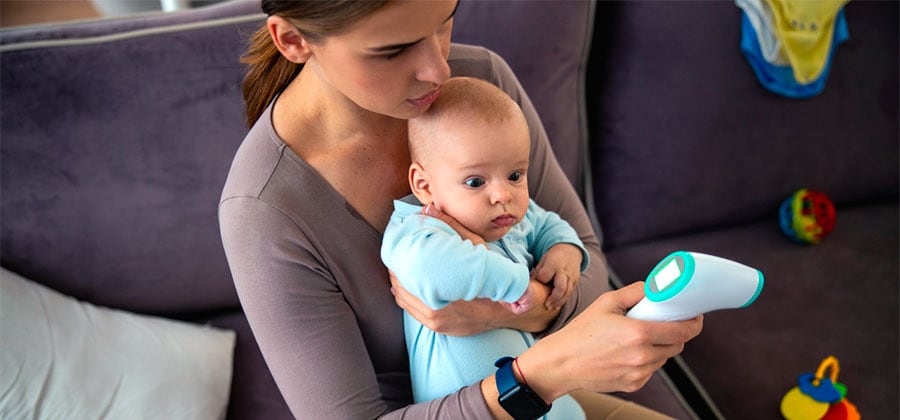Baby’s First Cold

Babies get colds, just like everyone else. Normally, the symptoms are the same as older children or adults and won't be cause for concern.
Still, baby's first cold is stressful for parents and uncomfortable for baby. Here are tips from Boys Town Pediatrics for helping your baby get through their first common cold.
Symptoms
- You can expect the usual… runny nose, cough, and though babies can't verbally complain, their fussiness will tell you they probably have a sore throat and maybe even a headache. This is all normal.
- Expect it to be mild and short-lived. While no parent wants to see their baby sick, it happens and most all cases end up with baby being happy and healthy.
When to See Your Doctor
- Under the age of one month, a fever is actually an emergency. A fever in a newborn is a temperature of 100° F or above.
- If your newborn develops a fever that high, get them to the doctor right away.
- Besides a fever, red flags for something more serious include difficulty breathing (beyond having just a stuffy nose).
- If it seems like they're breathing really fast and not slowing down, their nostrils are flaring, or they appear to have labored breathing, get baby in to be checked.
- If baby is feeding significantly less or seems too tired to feed, they need to be seen right away.
An Accurate Temperature Is Important
It's important you get an accurate temperature reading, so have a rectal thermometer at home. They are the most accurate and essential when taking a baby's temperature. Rectal thermometers are easy to use, and your baby won't feel a thing. Simply cover the end of the thermometer in petroleum jelly and insert it about one inch.
When Will Baby Be Back to Normal?
- Like most of us, baby should be better within seven to 10 days. If, after that time, they aren't better, schedule an appointment to get them checked.
Items to Keep in Your Medicine Cabinet
- A manual nasal suction device.
- Children's Tylenol for older babies. Perhaps ibuprofen for babies over six months.
- A humidifier to add moisture to a dry house to ease breathing.
While the common cold is cause for some concern, parents should mostly be attentive to their baby's symptoms and make them comfortable. Monitor the symptoms and if you notice anything out of the ordinary, call for an appointment or to talk to a member of the health care team.
3-6 Months;Cold and Flu;Illness;Health;Infant and Toddler Care;Newborn
Pediatrics
